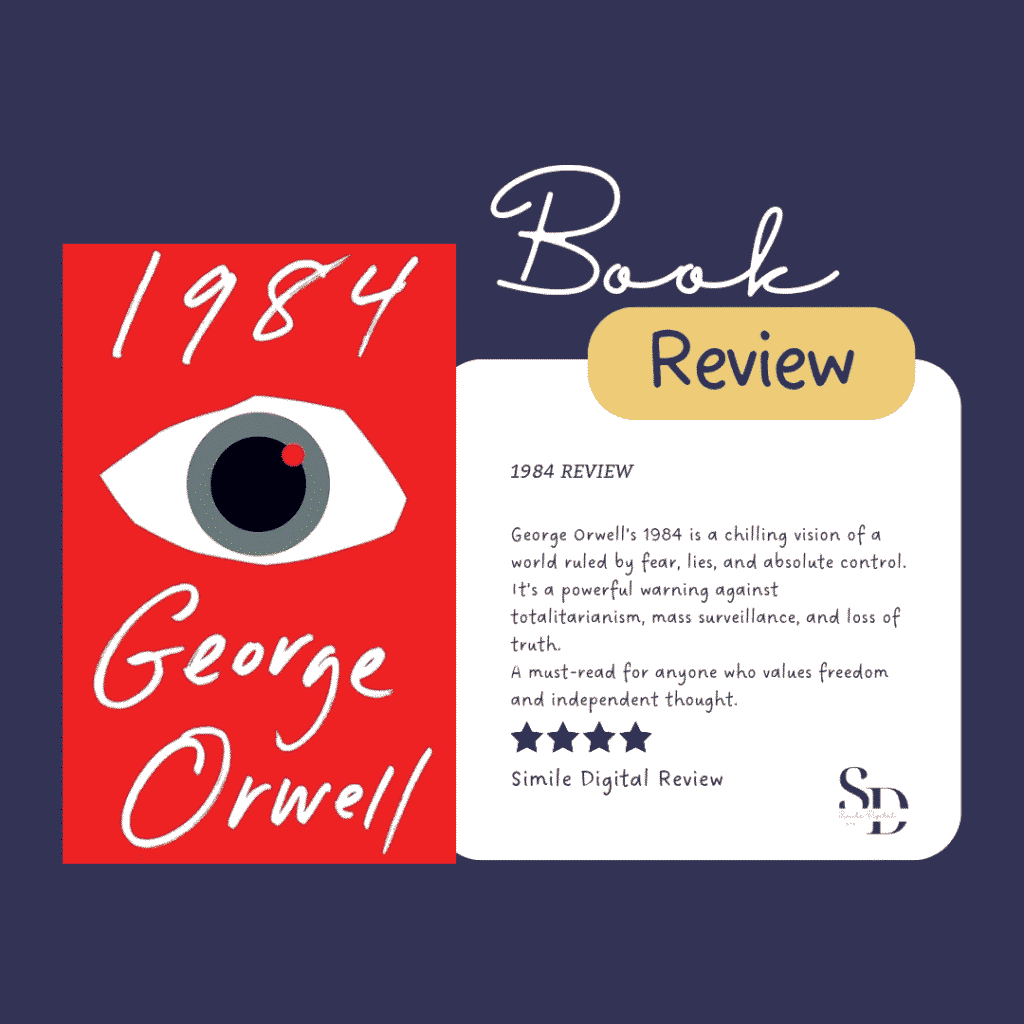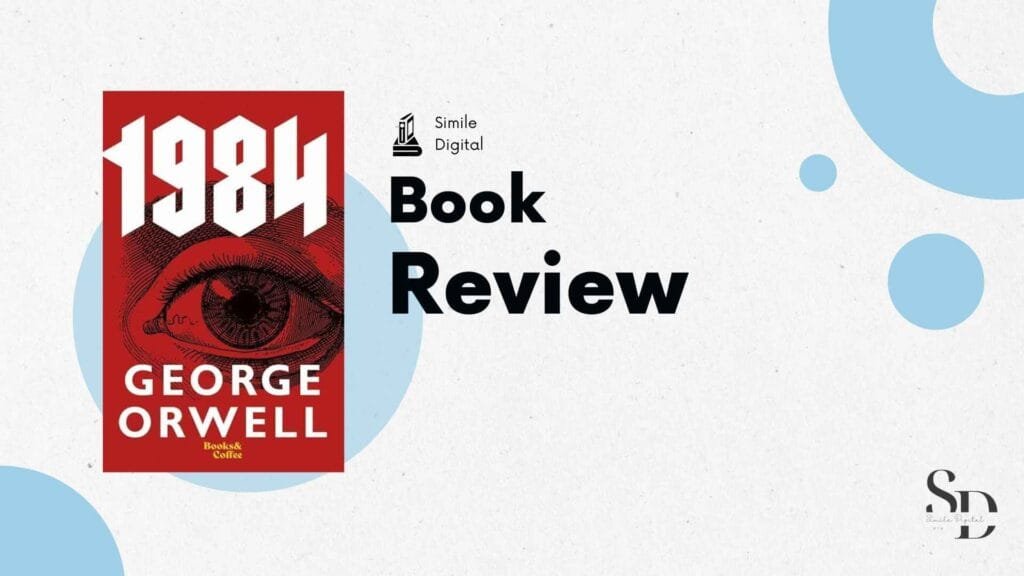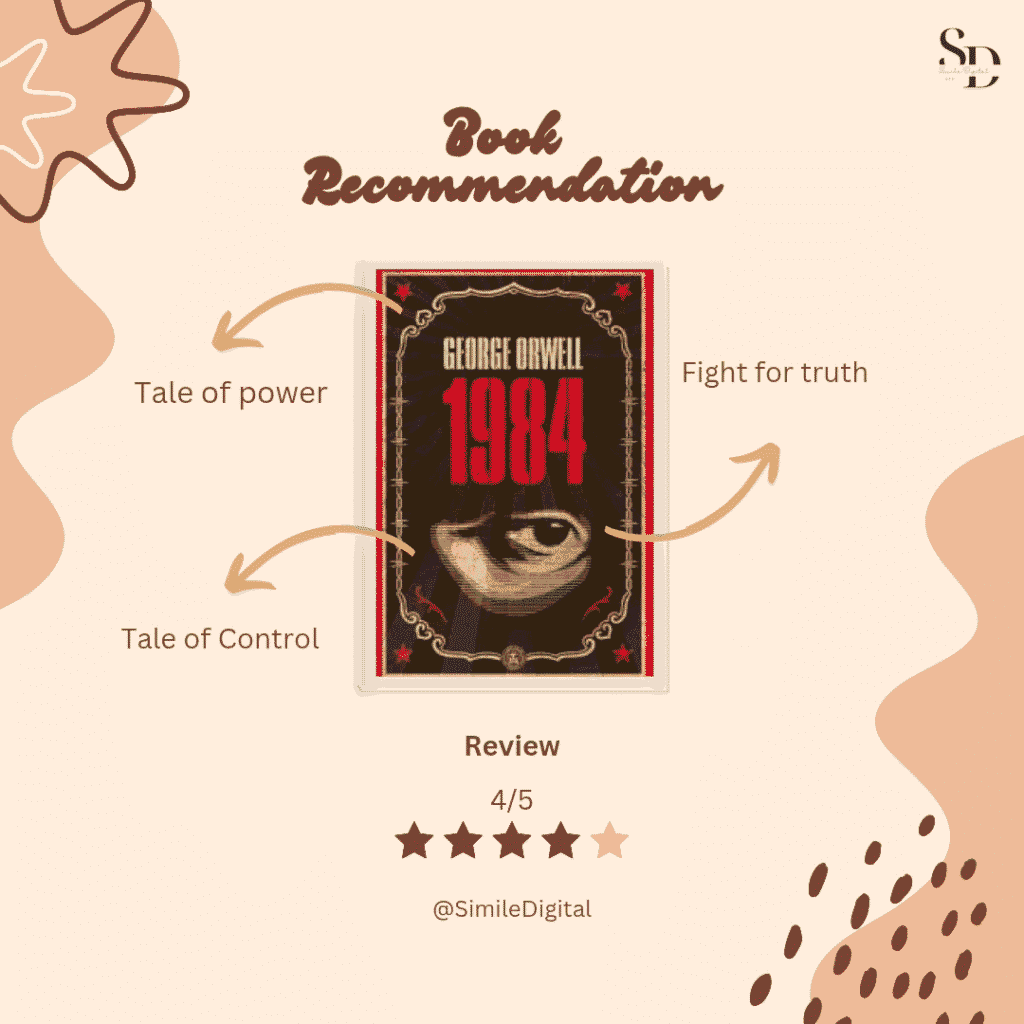1984 Book Review – Read our in-depth study of 1984 to see why this dystopian classic by George Orwell is still relevant today. Investigate its ideas, storyline, and legacy in this insightful literary evaluation.

Table of Contents
Introduction
1984 is a cautionary tale as much as a book. This dystopian novel, written by George Orwell and released in 1949, depicted a society in which people’s personal freedom is taken away, the truth is altered every day, and monitoring is ongoing. Even now, decades later, Orwell’s bleak outlook seems remarkably current.
This influential work was written by British author, journalist, and critic George Orwell (actual name Eric Arthur Blair), who was renowned for his lucid style and astute political observations. Before becoming a writer, Orwell was a member of the British colonial police in Burma, and his experiences had a significant impact on his writing. His two important works, Animal Farm and 1984, were influenced by his ardent support for democratic socialism and his vehement opposition to authoritarianism.
A terrifying vision of a society ruled by an all-seeing Party, where language is weaponized and even thoughts are controlled, is presented in Orwell’s 1984. Readers are led on a trip through psychological control, fear, and resistance via the eyes of Winston Smith, the primary character. The book pushes readers to defend their liberties, value truth, and confront authority.
Book Name: 1984
Author: George Orwell
Pages: Approximately 328 pages (may vary by edition)
1984 Book Review – A Timeless Warning Against Oppression
George Orwell’s 1984 isn’t just a novel—it’s a haunting mirror held up to society, revealing how easily freedom can crumble under control and deception. Published in 1949, this dystopian masterpiece feels eerily relevant today, as it explores themes of truth, surveillance, and the crushing weight of totalitarianism.
A World Without Freedom
The story is set in Oceania, a superstate ruled by the Party and its enigmatic leader, Big Brother. Here, the government controls everything—history, news, even thoughts. Telescreens watch citizens day and night, and “thoughtcrime” (holding rebellious ideas) is punishable by torture. The atmosphere is suffocating, filled with paranoia and despair. Orwell doesn’t need monsters or explosions to terrify readers; the real horror lies in how believable this world feels.
Winston Smith: A Reluctant Rebel
Winston, the protagonist, works at the Ministry of Truth, rewriting history to match the Party’s ever-changing lies. But unlike the brainwashed masses, he secretly craves truth and freedom. His quiet rebellion begins with a forbidden diary, then escalates when he falls in love with Julia, a fellow dissenter. Winston isn’t a hero—he’s flawed, fearful, and painfully human. That’s what makes his struggle so gripping. You root for him, even as the system tightens its grip.
Themes That Stick With You
Orwell’s genius lies in how simply he delivers terrifying ideas:
- Truth is Fragile: The Party doesn’t just lie—it erases the past. If records say 2 + 2 = 5, people must believe it. Sound familiar in today’s world of misinformation?
- Surveillance State: “Big Brother is watching you” isn’t just a slogan—it’s a reality. Privacy is dead, and dissent is crushed before it even forms.
- Language as Control: “Newspeak” is a language designed to eliminate rebellious thoughts by removing words like “freedom.” No words, no ideas, no resistance.
- The Cost of Defiance: Winston’s journey shows how hard it is to stay human in a system that turns people into obedient machines.
Why It Still Matters
1984 isn’t a cheerful read—it’s bleak, unsettling, and often hopeless. But that’s why it’s essential. Orwell forces us to ask:
- Could our world become like this?
- How much freedom are we willing to lose for “safety”?
- Can truth survive in an age of manipulation?
The book’s final act, especially the horrors of Room 101, leaves a scar. There’s no sugarcoated ending, just a chilling reminder of what happens when power goes unchecked.

Final Thoughts: A Must-Read Classic
Orwell’s writing is sharp, clear, and brutally effective. Some sections are slow (like the political explanations), but they’re crucial to understanding the nightmare Winston lives in.
Decades later, 1984 remains a warning—not just about dictatorships, but about complacency. In a world of mass surveillance, propaganda, and eroded privacy, Orwell’s message screams louder than ever: Freedom is fragile. Truth must be defended.
Whether you love dystopian fiction or just want a book that makes you think, 1984 will stay with you long after the last page.
Rating: ★★★★ (A timeless, unsettling masterpiece)
Top Quotes from 1984
- Big Brother is watching you.
The Party’s ever-present slogan—constant reminder that no one is ever truly alone. - War is peace. Freedom is slavery. Ignorance is strength.
The famous three-part paradox of the Party’s doctrine, showing how language can be twisted to control thought. - Who controls the past controls the future; who controls the present controls the past.
Winston’s chilling realization of how history is rewritten to suit those in power. - If you want a picture of the future, imagine a boot stamping on a human face—forever.
O’Brien’s brutal vision of unending oppression. - Perhaps one did not want to be loved so much as to be understood.
Winston’s quiet wish for human connection in a world built on fear. - Until they become conscious they will never rebel, and until after they have rebelled they cannot become conscious.
On the tragic cycle of ignorance and resistance. - We know that no one ever seizes power with the intention of relinquishing it.
A stark insight into the nature of totalitarian rule. - To die hating them, that was freedom.
Winston’s final act of defiance, proving that even in defeat, the human spirit can cling to autonomy.
Other Recommended Reads by George Orwell
- Animal Farm (1945)
A political fable about farm animals who overthrow their human farmer—only to find a new tyranny rising among themselves. - Homage to Catalonia (1938)
Orwell’s firsthand account of fighting with the anti-Stalinist militia in the Spanish Civil War. - Down and Out in Paris and London (1933)
A semi-autobiographical look at poverty, labour and survival in two great cities. - Burmese Days (1934)
A novel drawn from Orwell’s time in the British colonial police in Burma, critiquing imperialism. - The Road to Wigan Pier (1937)
Part reportage, part personal essay on the harsh living conditions of Northern England’s working class.
About the Author
- George Orwell was the pen-name of Eric Arthur Blair (1903–1950).
- Born in India to a British colonial civil servant, he was educated in England.
- Early in his life he served with the Imperial Police in Burma—a period that shaped his views on power and oppression.
- A committed democratic socialist, he wrote fiercely against totalitarianism in all forms.
- His clear, unadorned prose and deep moral conviction make his work as urgent today as when it was first published.
Conclusion
1984 by George Orwell is more than just a dystopian novel—it is a warning, a philosophical reflection, and a powerful message about freedom, truth, and control. It forces readers to ask uncomfortable but necessary questions about society, authority, and their own lives. Through Winston Smith’s eyes, Orwell shows us how fragile freedom is and how easily it can be taken away when people stop questioning what they’re told.

Whether you’re a student, a casual reader, or someone interested in politics and history, 1984 is a book that will challenge your thinking and deepen your understanding of the world. It is not just relevant—it is essential.
Book Link
You can easily find The Book in both physical and digital formats
E-Book: Available on Kindle, Google Books, Apple Books, and Kobo
Paperback/Hardcover: Available in local bookstores and major online retailers like Amazon, Flipkart
Audiobook: Available on Audible, Spotify, and Google Play
Thank You Note
Thank you for reading this detailed review of 1984 by George Orwell. I hope this helped you understand the book better and inspired you to either read or reflect on it more deeply. Your time and interest mean a lot. Stay curious, stay thoughtful—and always question what you’re told.
Happy reading!
For more comparisons, insights and review visit our blog regularly. If you have any questions or suggestions, feel free to leave a comment or contact us directly.
Frequently Asked Questions (FAQs)
What is the main message of the book?
Is the ending of 1984 hopeful or hopeless?
Why is 1984 still relevant today?
What age group is this book suitable for?
Is the world of 1984 realistic?
What does “Big Brother is watching you” mean?
Is 1984 based on a true story?
Note for Readers
If you’d like to read this blog in your regional language or any other international language, simply click on the Google Translator option located in the bar at the top of the page. This feature allows you to select your preferred language and enjoy the content in a way that’s comfortable for you. We hope this makes your reading experience more enjoyable and accessible!
Disclaimer
This review is written in original, simple language for educational and informational purposes. All quotes from the book 1984 are used under fair use for commentary. The opinions expressed here are my own, and this post is not affiliated with the publisher or the author’s estate.
For more exciting topics, explore our other articles here
- Adolescence Review
- Pride and Prejudice Review
- The Boy, the Mole, the Fox, and the Horse Review
- The Alchemist Review
- 10 Best Malayalam Movies Dubbed in Hindi (24–25)
- Top 5 Comedy Sitcoms Available on Hotstar Vs. Apple TV – A Laughter Showdown!
- Top 10 Sitcoms Available on Netflix Vs. Aws
- Top 10 Series Available on Disney+ Hotstar vs Jio Cinema
- Bollywood Top 15 Actors Vs Actresses
- Netflix vs Amazon: Top 5 Indian Series Showdown
- Netflix vs Amazon Prime: Top 10 Must-Watch Shows
- Coffee vs. Tea: Which Drink is Healthier?
- Green Tea vs. Black Tea: Taste, Health, and Tradition
2 Comments